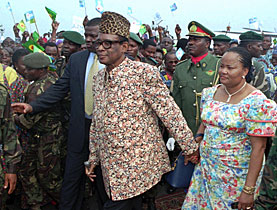Lawyer warns against returning Mobutu assets

Returning assets deposited in Swiss banks by the late president of Zaire, Mobutu Sese Seko, to his family would send a "terrible signal", warns a Swiss lawyer.
Mark Pieth, a professor of criminology at Basel University, has lodged a “citizen’s appeal” with the Federal Criminal Court and written to the Swiss government to try to extend a freezing order on Mobutu’s assets, worth SFr7.7 million ($6.68 million).
The assets have been frozen in Swiss bank accounts since 1997 and are due to be returned to Mobutu’s family on Thursday.
The Swiss authorities have repeatedly extended the freeze, unwilling to return the assets to Mobutu’s family but prepared to return them to the authorities in what is now the Democratic Republic of the Congo (DRC).
But on April 21 the Swiss Prosecutor’s Office declared that the statute of limitations had run out and the Mobutu funds would be returned to the family. The Congolese authorities have reportedly decided not to appeal against this decision.
swissinfo: Why have you undertaken this personal legal move against the Swiss Prosecutor’s Office and written to the government?
Mark Pieth: It’s quite unusual for a private citizen to take such a measure. Normally the authorities or parties from DRC would be the ones to do it. But we all know that the DRC has refused to continue to follow the money, as the Mobutu clan has a very strong role in that government itself. One of Mobutu’s sons is deputy prime minister and they have effectively undermined the recovery from the Congolese side.
And the Swiss authorities, the Swiss Prosecutor’s Office, have caved in too early, as Switzerland has a possibility to autonomously forfeit illegal funds found in Switzerland if there is an attachment to Switzerland. And that attachment can be money laundering or organised crime.
I am also the chairman of the International Centre of Asset Recovery (ICAR). I cannot just look on as this money is freed and goes back to one of the most bloodthirsty awful tyrants.
swissinfo: What is your legal argument?
M.P.: We agree with the Swiss Prosecutor’s Office and the Federal Criminal Court that a regime that has been systematically undermining human rights and stealing can be qualified as a criminal organisation. That is what the Federal Court did in the cases of Sani Abacha [in Nigeria] and Jean-Claude Duvalier [in Haiti].
So there is a relatively safe basis to say that these dictators and their entourage can be a criminal organisation. The only point of dispute is that the Federal Attorney’s Office is saying that with Mobutu’s death that was the end of the organisation.
But we are saying, hang on, his first son carried on – we have all kinds of evidence of criminal acts – and now other members of the family are back in office and continuing. From a distance I can see all kinds of indicators that this criminal organisation is still alive and kicking.
swissinfo: Why has it been so difficult to resolve this case and simply return the money to the Congolese people?
M.P.: I believe that everybody was counting on the mutual legal assistance avenue. Switzerland was trying to help Congo recover the money itself and actually paid a lawyer to achieve that.
But they didn’t really think that even though they were willing to foot the bill the Congolese government would suddenly turn against them and say ‘We don’t need this; we don’t want to appeal’, putting Switzerland in a very difficult situation.
We went down the wrong route, assuming that the country wanted the money back but didn’t realise how strong the Mobutu clan still is and how much hold they have over the government [of President Joseph Kabila].
swissinfo: So the DRC authorities are also to blame for the failure to secure the return of the assets…
M.P.: Absolutely. There is a very cynical side to the whole thing. We see repeated civil wars in Congo – there’s an ongoing one in eastern DRC. People are dying, probably amounting to a major genocide, and these guys are refusing to take the money needed to support their population there.
So my idea is very logical. Switzerland has the ability to take it and do what they want. They can put it into their federal treasury and then pay the same amount to Médecins Sans Frontières through another box of money to help the Congolese population that is suffering.
swissinfo: Does Switzerland still deserve a bad reputation as a safe haven for ill-gotten dictators’ gains?
M.P.: Obviously it’s a problem that you do find such money from the past in Switzerland, but we have done a lot in repatriating such money. There are very few countries in the world that are able to repatriate stolen funds at all. Switzerland has a very good track record.
Switzerland has a problem with its banking sector – nobody denies that. But one of the areas in which it has done relatively well in the past is this asset recovery issue of dictators.
Ferdinand Marcos [in the Philippines] took a lot of time, but Abacha was far better, and Vladimir Montesinos [in Peru] was a success, as were Duvalier and Kazakhstan.
It would send a terrible signal to the public if Switzerland were not able to keep this [Mobutu] money. Why risk the bad image if you have a legal tool to keep it?
swissinfo-interview: Simon Bradley
In response to a request for legal assistance by Kinshasa in 1997, the Swiss authorities froze SFr10 million deposited by Mobutu and his family.
They also auctioned off Mobutu’s villa on Lake Geneva for an additional SFr3.1 million in 2001.
In 2007 Swiss Foreign Minister Micheline Calmy-Rey said the Mobutu account contained about SFr8 million.
Under Swiss law the money cannot be returned to Congo without a court decision in that country.
In 2003 Switzerland concluded that the Congolese authorities were not able to institute legal proceedings that met constitutional criteria.
Without a proper ruling in Congo, the money would have gone to the Mobutu family at the end of 2008.
The Swiss government froze the accounts until April 30, 2009 to prevent this happening. A Swiss lawyer, acting for Congo, started proceedings.
On April 21 the Swiss Prosecutor’s Office declared that the money-laundering activities committed in Switzerland were barred by limitation as Mobutu was overthrown in May 1997. There was therefore no legal possibility to forfeit the funds in Switzerland.
On April 27 Swiss lawyer Mark Pieth lodged a formal appeal with the Federal Criminal Court against the decision of the Swiss Prosecutor’s Office and also wrote to the Swiss government asking them to extend the freezing order on Mobutu’s assets in Switzerland.
In 1965 General Mobutu Sese Seko came to power in Congo, a Belgian colony until 1960, in a coup and renamed the country Zaire in 1971.
After decades of dictatorship, Mobutu was ousted by the alliance under Laurent-Désiré Kabila who proclaimed himself president of the Democratic Republic of Congo in 1997.
Zaire’s new rulers accused Mobutu, who was forced into exile in Morocco where he died shortly afterwards, of siphoning off government funds and stashing away assets worth billions of francs in Switzerland.
Switzerland says the amount is far less.
When Kabila was assassinated in 2001 he was succeeded by his son, Joseph Kabila.

In compliance with the JTI standards
More: SWI swissinfo.ch certified by the Journalism Trust Initiative












You can find an overview of ongoing debates with our journalists here . Please join us!
If you want to start a conversation about a topic raised in this article or want to report factual errors, email us at english@swissinfo.ch.